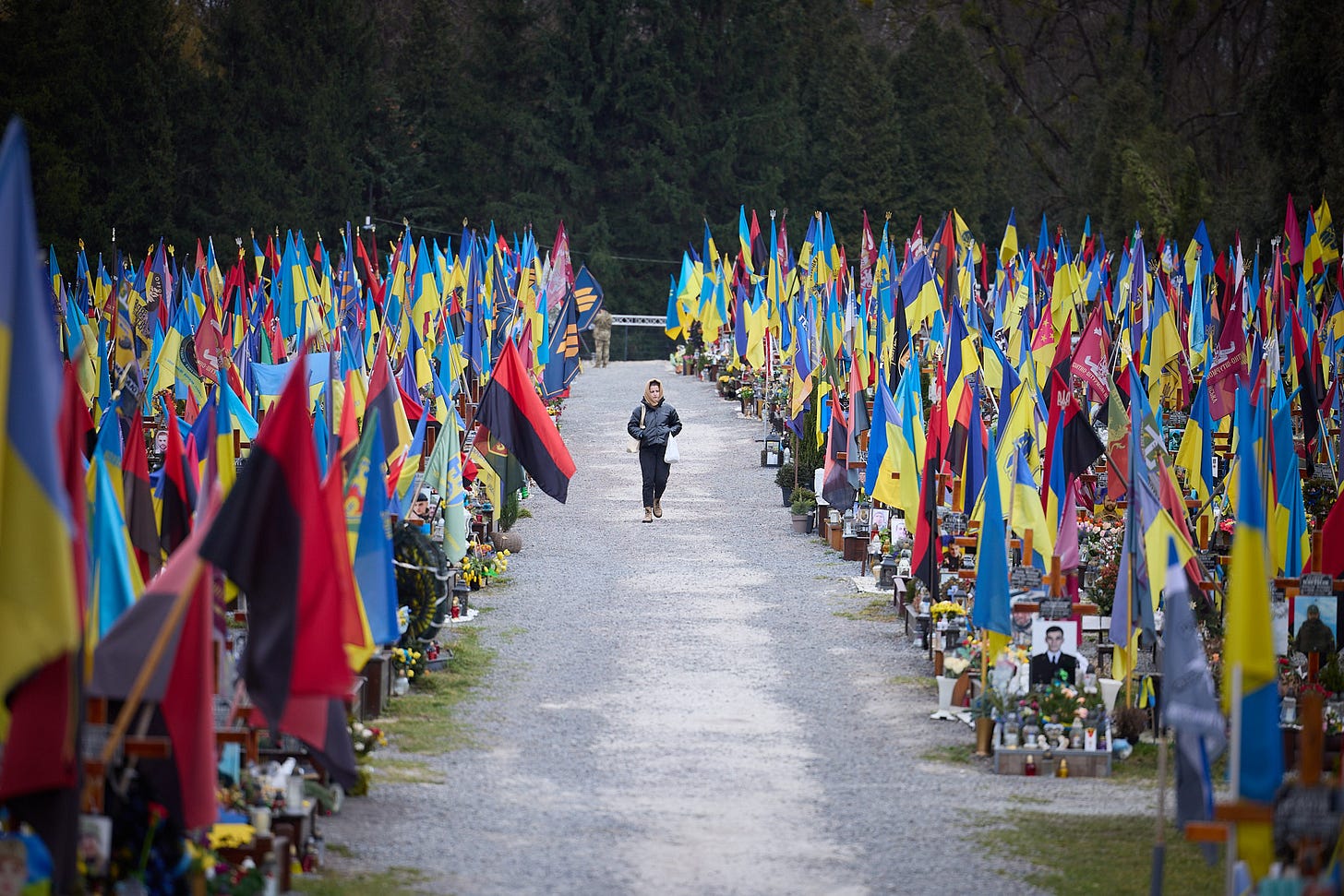Risk-Taking, the Condition of Statesmanship, and the Futile Prevention of War
Acting Before the Last Dusk
In Lviv, Volodymyr Zelenskyy and Mette Frederiksen honored the memory of the fallen defenders of Ukraine. Lychakiv Military Cemetery, February 23, 2024. Source: Office of the President of Ukraine
In the absence of sufficient and adequate intervention by the Allies in support of Ukraine, apprehension about risk played a major role. There is no need to reiterate here how much the Kremlin instilled fear, leveraged it to the fullest, and ultimately won on that front. Allied heads of state and government and their advisors bought into the beliefs about risk, skillfully distilled by Moscow, and acted accordingly, i.e., they refused to act. For them, there is no need to look for any complicity with Moscow; the lack of a deep understanding of Russian narrative strategy, which cannot be reduced to the crude manipulation of information that is most often cited, and, in many cases, a lack of statesmanship, is a sufficient explanation. I will not repeat again this all too familiar story.
There are certainly other reasons for the way political leaders have abdicated all responsibility and reason—cowardice per se (which is another aspect), corruption, a lack of understanding of the total nature of Putin’s war, which leads to the belief that it can be left to run its course, etc. But we can assume that risk assessment played a major role—which speaks volumes about the strategic unintelligence of a certain part of the diplomatic establishment surrounding the decision-makers. I have had the opportunity to explain all this in detail in numerous articles essays and in my book Notre Guerre. Le Crime et l’Oubli (Our War: Crime and Oblivion).
I will not go back over it directly, but will attempt to explain how risk can be formalized. This requires acknowledging the all-too-familiar paradox: the more we seek to eliminate immediate or short-term risk, the more we increase medium- and long-term risk. This ultimately sums up the attitude of most European countries and the United States toward Russia over the past 25 years.
Just before leaving his post as Chief of Staff of the Armed Forces, French five-star General Thierry Burkhard stated that there will come a time when we will have to accept taking risks. He was referring to the Coalition of the Willing, as it is somewhat inaccurately called, implying that it would have no significance without the possibility of accepting, at some point, a confrontation with Moscow. But many of his previous positions, including his solemn warning, in unison with other European colleagues, that Russia could well, in one way or another, be in a position to attack Europe before 2030, show that his remarks may be of more general significance. Incidentally, this speaks volumes about the famous “Coalition” that is supposed to be set up on the day there is a ceasefire, or even a peace agreement with Russia, which will never happen. But even under these conditions, it is hardly credible to think that, as the French president has stated, with the sole aim of appeasing public opinion, these troops would have no intention of going to “war” or seeking confrontation with Russia. Even if these troops are deployed, the risk will be just as great, if not greater than it is now, and the conditions for combat or retaliation will be much more difficult.
So the real risk to be faced is that of war with Russia. In a way, this risk is unavoidable and should not be avoided. The opposite risk would be that of enslavement or capitulation without even putting up a fight. The risk to be prevented, on the other hand, is that of losing the war, which means giving ourselves every chance of winning it—as the new Chief of Staff of the French Armed Forces, General Fabien Mandon, also wrote on the day he took office. So, logically, the issue is not the risk of war, but the minimization of the risks that war entails. This certainly reflects the position I have held for more than ten years: it was better to launch an early response to Russia’s attacks than to wait for it to commit further attacks and increase its hold on the world. The obligation to save human lives alone justified this action; strategic considerations also made it necessary.
However, a geostrategic analysis, which combines an understanding of war, global balances, and the perceived legitimacy of states and governments, cannot focus solely on the specific risks associated with war. It must also consider the risks associated with the overall consequences of action and inaction. Often overlooked, it must also take into account what the various scenarios imply for what I usually refer to as the public mind, in other words, the strength and unity of liberal and democratic societies—which means analyzing the risks of both action and inaction—and ultimately humanity itself.


